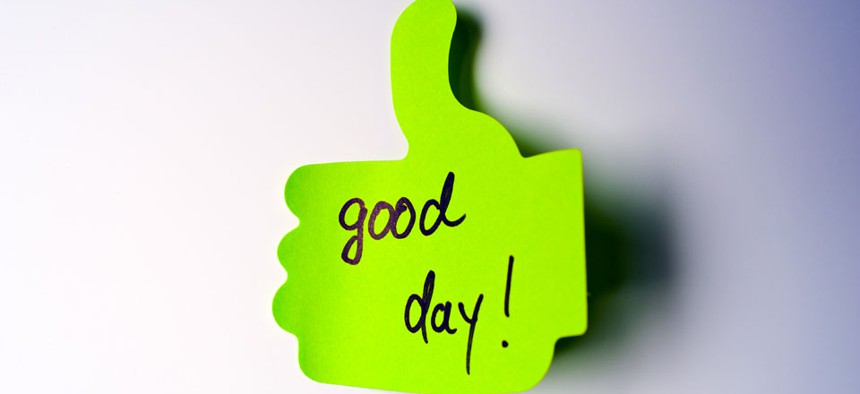
Firma V/Shutterstock.com
What Good Did You Do You Today?
Ask someone, and the answer might inspire a new connection.
I had been working in my hotel room in Wilmington, Delaware, most of the day last Wednesday and decided to head up to the concierge lounge to see if they had anything I could eat for dinner. As I got on the elevator, there was already a gentleman in the car who seemed a little stressed out. You know, some heavy sighs, comments of “What a day,” and things like that. Guessing that he was looking for a beer or a glass of wine, I told him I was headed for the lounge and to follow me.
Fortunately, they were serving chef salad, so I loaded up one of the little plates they use and sat down at a table to eat. It was crowded in the lounge and my new friend from the elevator asked if he could join me. I had brought a file folder of work to look at to prep for a leadership development program I was leading the next day but quickly decided that could wait.
As he took his first sip of white wine, it seemed to me the right question to open the conversation was, “So, what good did you do today?” He thought for a couple of seconds and said, “Well, I saved a sheep this morning.” The conversation got more interesting from there.
He told me had flown to the East Coast from a western state during the day but had gotten a much earlier wake-up call than he expected when a baby ewe on the small ranch that he and his wife keep woke up at 2 a.m. in distress. He had spent the early morning hours nursing and stabilizing the sheep and then had to head to the airport at 4:30 a.m. for his flight to Philadelphia.
We talked about his ranch and his 72 sheep and then got to why he was in Wilmington. It turns out that he is a psychologist and is an expert in the treatment of people with personality disorders who also have gambling addictions. Over the years, he’s developed an approach to treatment that uses cognitive based therapy rather than the 12-step approach that is used in many addiction programs. He was in Wilmington to lead a couple of days’ worth of workshops on his approach for other mental health professionals. He’s in high demand for professional development programs because his method yields a 74 percent success rate two years after treatment compared with a 12 percent to 22 percent success rate for 12-step programs. He’s 68 years old (he looks at least 10 years younger) and goes out on the road domestically and internationally four times a year to teach others what he’s learned.
When he’s not on the road, he’s taking care of his patients in three different clinics back home. Fascinated by his story, I asked if he had a website I could look at. He smiled and said that he didn’t because years before, some patients started stalking him. Since then he’s kept his virtual presence limited to landline phones for his offices and a cell phone number that patients can use to reach him outside of office hours.
When he’s home, he starts most days with a ride on his horse. He’s just put in a solar-powered pumping system to provide irrigation for his ranch. That will save him and his wife a lot of money on power bills and also help irrigate the crop of heritage vegetables they grow there.
So, you might be thinking, “That’s kind of an interesting story, but what’s it have to do with Mindful Mondays?” Here’s my answer. By slowing down, putting my work aside and asking a simple question like “What good did you do today?” I learned a ton about a range of topics over the next 30 minutes, was inspired by what someone has done with their life, heard some interesting stories and made a connection with another person that I didn’t know was in the world an hour earlier.
I’m not offering that as a pat on my own back for slowing down and asking the question. The fact is, if I had been a little more worried about the program I was leading the next day I probably would have made an excuse about why I couldn’t talk. It kind of makes me wonder what I’ve missed out on in the times when I’ve done exactly that.
Are you curious about what you might be missing by keeping your head down and focused on work or keeping conversations during the day solely focused on work? Why not look for one or two opportunities this week to start a conversation with no agenda? “What good did you do today?” worked for me as an opening question. What question might work for you?
(Image via Firma V/Shutterstock.com)







